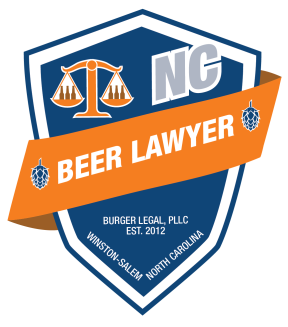



I have recently come across a number of clients inquiring about whether they have to register their trademark with the United States Patent and Trademark Office in order for their mark to have rights and be protected. Well the answer, in short, is no, you do not have to register your mark for protection, but it is a good idea.
You obtain common law trademark rights in your trademark as soon as you begin using your mark in association with selling your goods or services in commerce. So, if you label your keg, menu, tap handle, etc. with your brewery name (and actually sell your beer under these methods with the name), bada bing bada boom, you have common law trademark rights in your mark! That is great… but what do these common law rights protect, exactly? More specifically, how are these rights limited?
The biggest limitation to common law trademark rights is geographic. If you have an unregistered mark, your rights are confined to the geographic area where actual use of the mark has been established (so, where you sell your beer). This means that if you only sell your beer in North and South Carolina, and have not registered your mark with the USPTO, someone else could start selling beer in Oregon under the same name in good faith (meaning, they honestly did not know about your brewery- a much more common theme these days as the number of small craft breweries rises by the day across the country). Even though they started using the name after you, their common law trademark rights in their geographic area (where they are selling, not just where they are located) will supersede your rights in that area.
The potential for this geographic limitation to harm your potential expansion plans is apparent. If the same or similarly named brewery (it does not have to be a verbatim identically named brewery- just “confusingly similar”) decides to start shipping and selling their beer nationally (outside of North and South Carolina, where you can stop them from doing so), they can stop you from expanding outside of your geographic area. At this point, you are stuck. Your business cannot grow in a physical, geographic sense outside of North Carolina.
On top of the above, registering a mark with the USPTO is considered “constructive national use” of a mark, meaning that if the other brewery in Oregon files for their mark’s registration before you, they may obtain national rights to their mark that are stronger than your rights. They won’t be able to stop you from using your mark in North and South Carolina where you were already selling it before them, but they can stop you from expanding and from registering your mark.
At this point, the situation is rife with the potential for expensive litigation (fact finding for extent of actual use and argument over use can be extremely complicated and expensive). How could this be avoided? By simply undertaking the expense of a trademark clearance search early on in the use of your mark and registering your mark with the USPTO (thereby obtaining national rights, along with some additional rights).
I’ll summarize some of the additional rights federal USPTO registration can grant to a mark owner in my next blog post.